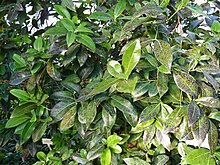Apollonias barbujana, the Canary laurel or barbusano, is perhaps the only species of flowering plants belonging to the genus Apollonias of the laurel family, Lauraceae. It is endemic to the Macaronesian islands of Madeira and the Canary Islands.[1] Molecular phylogenies have found that the species is nested within the genus Persea, closely related to Persea americana (avocado).[3]
| Apollonias barbujana | |
|---|---|

| |
| Scientific classification | |
| Kingdom: | Plantae |
| Clade: | Tracheophytes |
| Clade: | Angiosperms |
| Clade: | Magnoliids |
| Order: | Laurales |
| Family: | Lauraceae |
| Genus: | Apollonias |
| Species: | A. barbujana
|
| Binomial name | |
| Apollonias barbujana (Cav.) Bornm.
| |
The La Gomera subspecies, A. barbujana ceballosi, is distinct and endangered.[1][2]
References
edit- ^ a b c Beech, E.; da Silva Menezes de Sequeira, M.P.; Fernandes, F. (2017). "Apollonias barbujana". IUCN Red List of Threatened Species. 2017: e.T62567A81867959. doi:10.2305/IUCN.UK.2017-3.RLTS.T62567A81867959.en. Retrieved 11 November 2021.
- ^ a b Bañares, A.; et al. (1998). "Apollonias barbujana subsp. ceballosi". IUCN Red List of Threatened Species. 1998: e.T30321A9535286. doi:10.2305/IUCN.UK.1998.RLTS.T30321A9535286.en. Retrieved 28 July 2024.
- ^ Li, Lang; Li, Jie; Rohwer, Jens G.; van der Werff, Henk; Wang, Zhi-Hua; Li, Hsi-Wen (September 2011). "Molecular phylogenetic analysis of the Persea group (Lauraceae) and its biogeographic implications on the evolution of tropical and subtropical Amphi-Pacific disjunctions". American Journal of Botany. 98 (9): 1520–1536. doi:10.3732/ajb.1100006. PMID 21860056.

